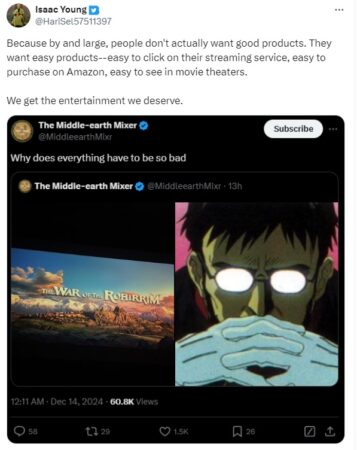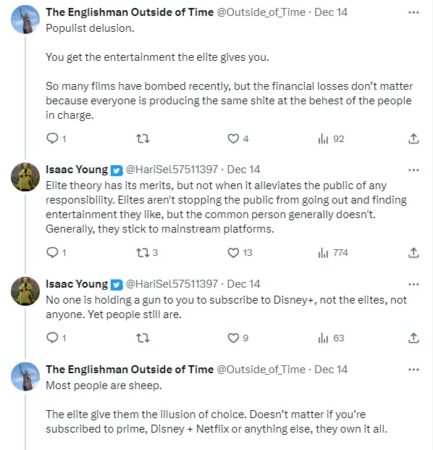A recent exchange online captured a recurring tension in the debate raging around entertainment and consumer culture.
One side argues that people don’t actually want good products—they want easy products. Ease of access governs most consumer decisions, which is why streaming services, retail giants, and movie franchises dominate the market.

The counter point is elite theory: The public gets what their betters decide to offer. And they maintain the illusion of choice only to keep people within systems of control. After all, whether you subscribe to Disney+, Netflix, or Amazon Prime, the same permanent class of managers own it all.

This debate reflects a common conundrum: Are we choosing our cultural decline, or is it being chosen for us?
In truth, both arguments contain merit—and both let individuals off the hook if they aren’t careful.
Related: Mark Kern – Calling All Gamers
It’s undeniable that powerful institutions hold a near-monopoly over entertainment and other goods. Elites do control the major platforms, studios, and distribution networks.
Yet no one is forcing you to give them your money. That part is up to you. So the illusion of choice becomes real the moment you decide to opt out.
It’s not about ease of access vs elite theory. It’s about sloth vs integrity.
Think back to the latest spate of boycotts. Conservatives and other disaffected customers have increasingly turned their frustrations on the corporate wing of the regime. They’ve realized that megacorporations not only push values antithetical to theirs but do so while demanding their continued financial support.
And yet, many remain locked into the cycle. They are disappointed when their beloved franchises degrade but continue subscribing and purchasing, as if they have no alternative.
These boycotts may not make financial dents in global conglomerates—just as voting seems to have little effect on the output of government—but they matter for a different reason.
When you stop giving money to people who hate you, you refuse to participate in your own spiritual and cultural defilement. You opt out of cooperating with those advancing grave intrinsic evils.
This act, however small it may feel, carries moral weight. It’s not about imagining you can bankrupt a megacorporation with your canceled subscription or choosing an obscure indie fantasy series over the latest rehash of Big Fantasy Brand X. It’s about recognizing that, while elites dominate pop culture, they still rely on our cooperation to claim a consensus.
The illusion only works ff you play along.
In reality, people do bear some responsibility for the entertainment and products they consume. The public could seek out better alternatives. Good books, games, and movies do exist; they’re just harder to find than corporate slop. But most people won’t bother looking because easy options are, well, easy.
This is where Isaac’s point rings true: The average person gravitates toward whatever the algorithm puts in front of him.
And that’s what makes the cycle so vicious. People seek shun friction, and corporations deliver ease at the cost of quality. Customers then lament the decline of franchises they once loved, all the while paying tribute to the cultural vandals.
So while elites do provide the illusion of choice, in most cases they don’t need to enforce compliance. They rely on sloth and inertia.
Related: It’s Not the Economy
All of that is to explain why morally, opting out matters. It breaks the inertia. It pierces the illusion. And it forces you to look elsewhere: beyond what’s easy, past what’s fed to you. Not paying people who hate you is a small, necessary step toward resisting cultural decline.
Because you only become free by becoming holy.
In the end, refusing to cooperate with corrupt systems, even at the level of entertainment, transcends cultural reform. Instead, it’s first and foremost concerned with personal transformation.
If we want liberation from systems that despise us, we must first stop participating in our own spiritual decay. And that dissent begins with small, practical acts of resistance.
Choosing integrity over convenience is not a grand political act, nor does it need to be. It’s an act of virtue, and practicing virtue is always the first step toward true liberation.
Get early access to my works in progress, the chance to influence my books, and a VIP invite to my exclusive Discord.
Sign up at Patreon or SubscribeStar now.
“Happy, hopeful, and practical”
Learn to regain your dignity and have fun while you’re at it! Read now:




The cost of convenience has become really high. We’re on pace to discover just how much the path of least resistance is straight down.
Older generations really did mortgage America’s future.
Not only that but tech and efficiency bros are outsourcing our livelihoods and humanity. “Look at what this robot can do! So much better than a human!”
The majority of people aren’t avoiding modern slop because it’s “woke” or because the companies hate them or even that they know it is bad. They just aren’t bothering because it’s inconvenient to. They were trained to be content consumers, and they moved over to other means of quick and cheap (even free) entertainment. The deciding factor in why we are stuck in cultural limbo right now isn’t greed or pride like many think, though they do contribute, but mostly because of sloth, even from those in control. Everyone wants someone else to fix the problem, including the people who have the power to fix it right this very second. It’s what happens when no one is ever held accountable for doing wrong.
Amen. We will get better entertainment and government when we become a people worthy of them. The good news is that each of us can exercise control in that personal sphere.
“The deciding factor in why we are stuck in cultural limbo right now isn’t greed or pride like many think, though they do contribute, but mostly because of sloth, even from those in control. Everyone wants someone else to fix the problem, including the people who have the power to fix it right this very second. It’s what happens when no one is ever held accountable for doing wrong.”
A long while ago, reading one of your blog posts, I remember you saying that much of the 20th century was defined by people viewing things through a lense of determinism (i.e. ‘Progress’ will occur no matter what you do). I’d say that in the 21st century, this view has now split in two groups: people whose philosophy has descended into full-blown accelerationism and those who’ve adopted a variant of nihilism. Even those who want to return to the post-WW2 status quo are still aiming to create some sort of continuous stasis where things are never really meant to change.
It’s like people came to realize that what they were aiming for was in fact a utopian falsehood that would never come to pass, so they decided to either burn everything to the ground or simply ‘enjoy the show’ and watch whilst others did. They couldn’t create a man-made Heaven on earth, so (in their mind) creating and/or doing good is pointless. Instead, they’ve now replaced this with viewing fellow human beings as either an instrument of ‘the revolution’, or hopeless fools beyond salvation for whom no time shall be spent, either through assistance or prayer.
Many people would mock me for saying you need Faith, but it’s true. Because once you accept that neither you nor anyone else can be made perfect, this means that you’ll have to place your trust in God and other people. It means that you’ll actually have to build a society based in Truth and not some false man-made ideology that promises to bring about a land of milk & honey if only everyone did X, Y and Z. It means you’ll actually have to treat everything and all around you with a measure of care and not as something expendable that can be thrown away the moment it becomes a personal problem.
For now, beyond taking action in your own personal life, you can only hope and pray that such a shift in mindset may come to pass…
I have Boomer relatives who will spend an hour going through a Zoomer doom scroll on Tiktok or Youtube shorts. Why? The content that they’re seeing isn’t very good, it isn’t aimed at retirees, and they have a wealth of other content to watch through streaming, DVDs, or just reading a damn book or talking a walk outside. Unlike Zoomers, they have gotten their entertainment without the doom scroll for most their lives.
But sitting down and mindlessly scrolling up to the next video is very, very convenient. So that is what they end up doing.
To be honest, I’m not sure that it’s possible to regain the mainstream audience without a collapse of the tech bubble. There are plenty of people who realize how crap the modern state of the internet is and break away to find quality, and these people CAN be reached. But recent years have showed us again and again that such people are always going to be in the minority.
“All of that is to explain why morally, opting out matters. It breaks the inertia. It pierces the illusion. And it forces you to look elsewhere: beyond what’s easy, past what’s fed to you.”
There’s a similar dynamic going on right now in the world of computer tech that I’ve been calling the “convenience trap”. Seems like everybody wants to complain about the spying, censorship, and Sauron-like desire for control of these big tech megacorps. But when I talk about the alternatives that already exist and have existed for years now, everybody starts balking because they’re not as (marginally!) convenient, or have as pretty of a GUI. Heaven forbid people might have to learn Basic Concepts of How A Computer Works that they’ve been putting off for close to thirty years now. And that’s where the problem lies. Most people took up these “services” from Big Tech starting somewhere in the 2000s because they offered all of the benefits of computers…without the cost of mastery and learning. A twisted Esau bargain trading power over our communications to Silicon Valley for this soup of “convenient” computing.
Yes, it’s been inconvenient at times for me using GrapheneOS on my smartphone and Linux on my desktop computers. For starters, Kindle and all the major streaming services are basically unusable. In a strange and providential way, opting out of what’s fed to us by the elites of Silicon Valley for computing has also necessitated the need to opt out of the culture being fed to us by the elites of oldpub, Hollywood, the record labels, etc. The same uncreative sickness that has them producing woke slop stories also affects their lack of creativity in business models and computer technology. Their business model is and has been to lock away culture itself and deny by any means the existence of better alternatives. And because they are (rightfully) deathly afraid of pirate sources accidentally revealing how much people truly value their output, the cultural elites constantly burden their digital movies, ebooks, games, etc with DRM systems of control that marginalize or refuse access to anybody not using the software of some Big Tech giant.
There’s a providential convergence happening between open source computing, it’s need for entertainment and culture easily accessible because it’s not technologically controlled by cultural elites, and the general need for cultural rejuvenation by Christians. Opportunity beckons for Christian artists to set themselves above and apart from the stuffy entertainment boardroom degenerates in more ways than just an excellent story itself.
There is no excuse for tolerating the crud being offered to us by both Silicon Valley and Hollywood, because while they may not be the exact same group of elites, they sure are sleeping in bed together. Using software like Linux or GrapheneOS is a “small, practical act of resistance”. Choosing the integrity of our computer devices over the convenience of Silicon Valley is becoming more and more an act of virtue. If anybody wants to start refusing to cooperate with corrupt systems, starting with your computer systems isn’t a bad place to do so with plenty of help available.
On a related note, it’s impressive how quickly the Dragon Awards turned into a medal for being a Tor darling in literature, or corpo slop in other forms of media.
I don’t even expect that con politics are to blame. It’s just the easiest way for most people to vote.
The usual suspects enlisted the American Library Association to farm votes for their pet ticket-takers. This, despite oldpub’s brazen hatred for libraries. Never underestimate Stockholm syndrome.